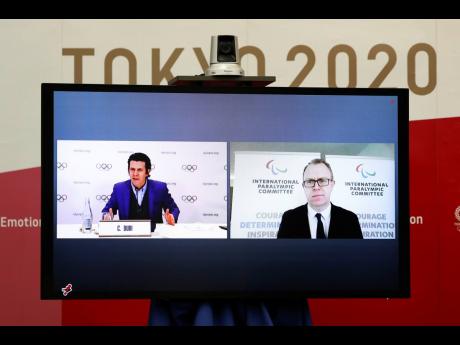Tokyo Games offer Playbooks to assure athletes, sway public
TOKYO (AP):
It will be an Olympics like no other, the world’s largest mega-sports event being staged in the middle of a pandemic.
Tokyo organisers and the IOC yesterday began explaining in public just how they hope to do it, rolling out “Playbooks” to detail the ways that 15,400 athletes will enter Japan – and exit Japan – with the Olympics opening on July 23 and the Paralympics a month later.
“There are indeed a lot of questions in the public domain about how the Games will take place this summer. And today (yesterday) is a preliminary review of how things will be done,” Olympic Games executive director Christophe Dubi said in a video news conference with Tokyo officials.
The rollout of the Playbooks is aimed at assuring athletes, and an attempt to convince the Japanese public that the Olympics should go ahead. Polls across Japan show up to 80 per cent want the Olympics postponed or canceled. The public sees the health risk in a country that has controlled the virus better than most.
The Playbook introduced yesterday is aimed at international sports federations and technical officials. Guides for athletes, broadcasters and the media will come in the next few days. They are all similar, and these are all the “first versions.” Much of the information is still vague with more details coming in updates in April and June.
The IOC held a similar session earlier in the week with Olympic athletes and their representatives to explain the stringent guidelines in their rule books.
On that video conference, obtained by The Associated Press, IOC President Thomas Bach spelled out the large unknown.
“At this moment in time, no scientist can predict the health situation in 206 national Olympic committees at the time of the Olympics,” Bach told the athletes, adding the IOC was learning day-to-day and asked for the athletes’ patience.
Games operation director Pierre Ducrey explained the general procedure for entering Japan. Both Dubi and Ducrey called the Playbooks a “framework.”
“In the playbook we are documenting what will be the typical journey for a stakeholder group starting with measures 14 days prior to departure,” Ducrey said. “Including a test before you leave your county, a test upon the time you enter the country, and testing for each stakeholder group while they are in Japan.”
Tested every four days
Olympics officials said they expect athletes to be tested at least every four days. They are being encouraged to arrive in Japan five days before their event and leave two days after.
Dubi was asked about fans. It seems clear that fans from abroad will not be allowed but he did not confirm it.
“The decision is not made at this point in time but at some point in the course of spring we will have to make this decision regarding the number of spectators – the proportion of spectators in the stadium – and the also the question of spectators from outside,” Dubi said.
The rollout comes two weeks after a British newspaper, citing an unnamed Japanese government official, said the Olympics would be canceled. The IOC and Japanese organisers have pushed back for two weeks, and the Playbooks offer some concrete plans after months of vague talk.
“No matter what situation would be with the coronavirus, we will hold the Games,” Yoshiro Mori, the president of the Tokyo organising committee and a former Japanese prime minister, told lawmakers on Tuesday. “We should pass on the discussion of whether we will hold the games or not, but instead discuss how we should hold it.”

